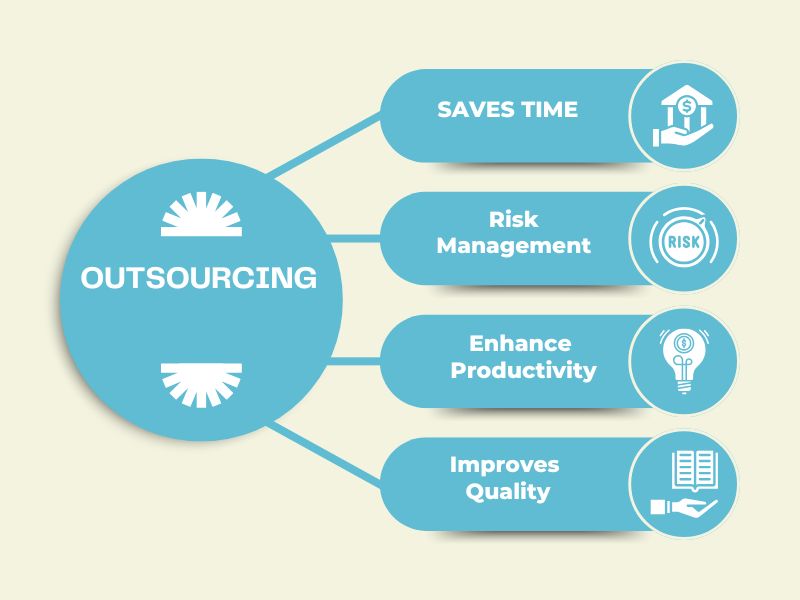In today’s dynamic corporate landscape, the pursuit of efficiency, scalability, and cost optimization has led organizations to embrace two transformative approaches: outsourcing and automation. These strategies are not merely tools for operational improvement; they are catalysts for business development and expansion. Let us dive in and explore how outsourcing and automation each contribute to robust financial management, and why their combined potential is a game-changer for growth-focused enterprises.
The Strategic Role of Outsourcing
Outsourcing offers a human-centric, expertise-driven solution to managing complex financial tasks. Unlike automation, which excels in handling repetitive functions, outsourcing brings strategic value to nuanced decision-making and long-term planning.

Key Benefits of Outsourcing
- Access to Expertise and Industry Insights
- Specialized Knowledge: Outsourcing connects businesses with financial professionals who bring deep expertise in areas like compliance, tax regulations, and risk management.
- Strategic Guidance: Outsourced teams deliver actionable insights, helping companies optimize decision-making and navigate financial complexities effectively.
- Flexibility and Scalability
- Adaptable Resources: Outsourcing allows businesses to scale financial services based on seasonal demands or specific project needs.
- Peak Performance Support: Whether during audits or tax seasons, outsourcing offers on-demand assistance tailored to critical business moments.
- Cost Efficiency
- Savings on Training and Staffing: Companies reduce overhead costs by leveraging external expertise without investing in in-house teams.
- Tailored Solutions: Outsourced services are customized to align with a company’s unique financial goals, ensuring maximum value.
- Comprehensive Financial Management
- Broad Scope of Services: From budgeting and forecasting to compliance and audits, outsourcing covers the full spectrum of financial tasks.
- Reliability: Human oversight ensures meticulous attention to detail, minimizing errors in intricate processes.
- Enhanced Strategic Focus
- Resource Optimization: With operational tasks handled externally, internal teams can prioritize innovation and strategic initiatives.
- Smarter Decisions: Outsourced experts consider market trends and organizational goals, driving informed financial planning.
The Efficiency of Automation
Automation shines in its ability to handle repetitive, time-consuming tasks with precision and speed. Its role in business development lies in freeing resources and enabling seamless operations.

Core Advantages of Automation
- Streamlined Processes
- Automation tools excel in payroll processing, invoice generation, and data entry, ensuring consistency and speed.
- Reduced Operational Costs
- By automating repetitive tasks, businesses save on labor costs and reduce the risk of human errors.
- Real-Time Data Access
- Automation provides instant access to updated financial data, enabling quicker decision-making.
- Scalable Infrastructure
- Automated systems can be adjusted to match a company’s growth trajectory without the need for extensive reconfigurations.
Outsourcing and Automation: A Synergistic Approach
While outsourcing and automation are powerful individually, their true potential lies in synergy. Automation handles routine processes efficiently, while outsourcing ensures strategic oversight and decision-making. Together, they empower businesses to optimize resources, reduce costs, and scale effectively.
- Enhanced Productivity: Automation handles high-volume tasks, allowing outsourced professionals to focus on complex challenges.
- Cost-Effective Growth: By integrating both approaches, businesses can achieve scalable financial management at a fraction of the cost.
- Strategic Agility: Outsourced experts can leverage automated tools, blending technological precision with human intelligence for superior outcomes.
Conclusion: Unlocking Growth Potential
Outsourcing and automation are not competing solutions but complementary strategies that drive business development and expansion. Outsourcing delivers expertise, strategic insight, and flexibility, while automation ensures efficiency and consistency in routine operations. Together, they form the backbone of a robust financial management framework, empowering businesses to achieve long-term growth.
For companies aiming to enhance their financial operations, adopting a balanced approach to outsourcing and automation is the ultimate key to sustainable success.
